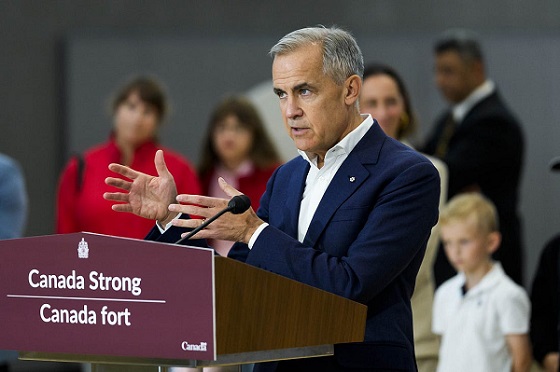Business
CBC approves more bonuses for 1,200 staff

From the Canadian Taxpayers Federation
Author: Ryan Thorpe
Among the accomplishments the CBC cites to justify future bonuses, is the fact that among Canadians who use its digital services, “each unique visitor… spends 37.6 minutes every month” on its website – an average of less than 90 seconds per day.
The Canadian Broadcasting Corporation approved future bonuses for its executives and non-unionized staff, according to the state broadcaster’s latest annual review.
On June 25, the CBC quietly published a notice on its website announcing the approval of another round of bonuses, less than a week after the latest parliamentary session ended.
The bonuses are for work done in the 2023-24 fiscal year. It’s unclear at this time how much this next round of CBC bonuses will cost taxpayers. The approval of future CBC bonuses was first reported by La Presse.
“There’s no way taxpayers should be paying for another round of CBC bonuses,” said Franco Terrazzano, CTF Federal Director. “And it’s a little suspicious the CBC chose to quietly publish this news days after Parliament broke for summer and after CBC President Catherine Tait was routinely grilled by MPs on this very topic for months.”
The CBC rubberstamped $14.9 million in bonuses in 2023, according to internal documents obtained by the CTF. The CBC cut 346 jobs during the 2023-24 fiscal year.
Since 2015, the CBC has handed out $114 million in bonuses.
In its strategic plan, the CBC lists five vague “key performance indicators” that trigger bonuses for staff. The CBC says its “annual report, with comprehensive reporting of the 2023-24 [KPI] results, will be available to the public later this summer.”
Among the accomplishments the CBC cites to justify future bonuses, is the fact that among Canadians who use its digital services, “each unique visitor… spends 37.6 minutes every month” on its website – an average of less than 90 seconds per day.
A total of 1,194 non-unionized CBC staff have been approved to receive another bonus.
Tait’s annual pay is between $472,900 and $623,900, which includes salary, bonus and other benefits, according to the CBC’s senior management compensation summary.
In 2014, Tait’s predecessor, Hubert Lacroix, told a Senate committee his annual bonus was “around 20 per cent.”
Even the state broadcaster acknowledged “the views expressed by some that [bonuses] should not be awarded … in times of financial pressures and associated workforce reductions.”
“As a result … [the CBC] is launching a comprehensive review of the Corporation’s compensation regime, including [bonuses],” according to the annual review. “This review will be conducted by a third-party human resources consulting firm.”
It remains unclear at this time how much this third-party review will cost taxpayers.
“The CBC doesn’t need to waste more tax dollars reviewing its bonus scheme, it needs to end the bonuses for good,” Terrazzano said. “If Tait isn’t willing to do the right thing, then the heritage minister, finance minister or Prime Minister Justin Trudeau must step in and stop these taxpayer-funded bonuses.”
The CBC will take $1.4 billion in taxpayer cash this year, an all-time high. The federal government also gave the CBC a $42-million funding top-up in Budget 2024 after Tait complained the state broadcaster is subject to “chronic underfunding.”
Agriculture
Cloned foods are coming to a grocer near you

This article supplied by Troy Media.
And you may never find out if Health Canada gets its way
Cloned-animal foods could soon enter Canada’s food supply with no labels identifying them as cloned and no warning to consumers—a move that risks public trust.
According to Health Canada’s own consultation documents, Ottawa intends to remove foods derived from cloned animals from its “novel foods” list, the process that requires a pre-market safety review and public disclosure. Health Canada defines “novel
foods” as products that haven’t been commonly consumed before or that use new production processes requiring extra safety checks.
From a regulatory standpoint, this looks like an efficiency measure. From a consumer-trust standpoint, it’s a miscalculation.
Health Canada argues that cloned animals and their offspring are indistinguishable from conventional ones, so they should be treated the same. The problem isn’t the science—it’s the silence. Canadians are not being told that the rules for a controversial technology are about to change. No press release, no public statement, just a quiet update on a government website most citizens will never read.
Cloning in agriculture means producing an exact genetic copy of an animal, usually for breeding purposes. The clones themselves rarely end up on dinner plates, but their offspring do, showing up in everyday products such as beef, milk or pork. The benefits are indirect: steadier production, fewer losses from disease or more uniform quality.
But consumers see no gain at checkout. Cloning is expensive and brings no visible improvement in taste, nutrition or price.
Shoppers could one day buy steak from the offspring of a cloned cow without any way of knowing, and still pay the same, if not more, for it.
Without labels identifying cloned origin, potential efficiencies stay hidden upstream. When products born from new technologies are mixed with conventional ones, consumers lose their ability to differentiate, reward innovation or make an informed choice. In the end, the industry keeps the savings while shoppers see none.
And it isn’t only shoppers left in the dark. Exporters could soon pay the price too. Canada exports billions in beef and pork annually, including to the EU. If cloned origin products enter the supply chain without labelling, Canadian exporters could face additional scrutiny or restrictions in markets where cloning is not accepted. A regulatory shortcut at home could quickly become a market barrier abroad.
This debate comes at a time when public trust in Canada’s food system is already fragile. A 2023 survey by the Canadian Centre for Food Integrity found that only 36 per cent of Canadians believe the food industry is “heading in the right direction,” and fewer than half trust government regulators to be transparent.
Inserting cloned foods quietly into the supply without disclosure would only deepen that skepticism.
This is exactly how Canada became trapped in the endless genetically modified organism (GMO) debate. Two decades ago, regulators and companies quietly introduced a complex technology without giving consumers the chance to understand it. By denying transparency, they also denied trust. The result was years of confusion, suspicion and polarization that persist today.
Transparency shouldn’t be optional in a democracy that prides itself on science based regulation. Even if the food is safe, and current evidence suggests it is, Canadians deserve to know how what they eat is produced.
The irony is that this change could have been handled responsibly. Small gestures like a brief notice, an explanatory Q&A or a commitment to review labelling once international consensus emerges would have shown respect for the public and preserved confidence in our food system.
Instead, Ottawa risks repeating an old mistake: mistaking regulatory efficiency for good governance. At a time when consumer trust in food pricing, corporate ethics and government oversight is already fragile, the last thing Canada needs is another quiet policy that feels like a secret.
Cloning may not change the look or taste of what’s on your plate, but how it gets there should still matter.
Dr. Sylvain Charlebois is a Canadian professor and researcher in food distribution and policy. He is senior director of the Agri-Food Analytics Lab at Dalhousie University and co-host of The Food Professor Podcast. He is frequently cited in the media for his insights on food prices, agricultural trends, and the global food supply chain.
Troy Media empowers Canadian community news outlets by providing independent, insightful analysis and commentary. Our mission is to support local media in helping Canadians stay informed and engaged by delivering reliable content that strengthens community connections and deepens understanding across the country.
Business
Bank of Canada governor warns citizens to anticipate lower standard of living

From LifeSiteNews
“Unless something changes, our incomes will be lower than they otherwise would be.”
Bank of Canada Governor Tiff Macklem gave a grim assessment of the state of the economy, essentially telling Canadians that they should accept a “lower” standard of living.
In an update on Wednesday in which he also lowered Canada’s interest rate to 2.25 percent, Macklem gave the bleak news, which no doubt will hit Canadian families hard.
“What’s most concerning is, unless we change some other things, our standard of living as a country, as Canadians, is going to be lower than it otherwise would have been,” Macklem told reporters.
“Unless something changes, our incomes will be lower than they otherwise would be.”
Macklem said what Canada is going through “is not just a cyclical downturn.”
Asked what he meant by a “cyclical downturn,” Macklem blamed what he said were protectionist measures the United States has put in place such as tariffs, which have made everything more expensive.
“Part of it is structural,” he said, adding, “The U.S. has swerved towards protectionism.”
“It is harder to do business with the United States. That has destroyed some of the capacity in this country. It’s also adding costs.”
Macklem stopped short of saying out loud that a recession is all but inevitable but did say growth is “pretty close to zero” at the moment.
While some U.S. protectionist measures put in place by President Donald Trump have impacted Canada, the reality is that since the Liberals took power in 2015, first under former Prime Minister Justin Trudeau and now under Mark Carney, government spending has been out of control, according to experts. Rising inflation is rampant.
Canadian taxpayers are already dealing with high inflation and high taxes, in part due to the Liberal government overspending and excessive money printing, and even admitting that giving money to Ukraine comes at the “taxpayers’” expense.
As reported by LifeSiteNews, Carney boldly proclaimed earlier this week that his Liberal government’s upcoming 2025 budget will include millions more in taxpayer money for “SLGBTQI+ communities” and “gender” equality and “pride” safety.
As reported by LifeSiteNews, the Canadian Taxpayers Federation (CTF) recently blasted the Carney government for spending $13 million on promotional merchandise such as “climate change card games,” “laser pens and flying saucers,” and “Bamboo toothbrushes” since 2022.
Canadians pay some of the highest income and other taxes in the world. As reported by LifeSiteNews, Canadian families spend, on average, 42 percent of their income on taxes, more than food and shelter costs. Inflation in Canada is at a high not seen in decades.
-

 Alberta2 days ago
Alberta2 days agoFrom Underdog to Top Broodmare
-

 Business1 day ago
Business1 day agoCanada’s economic performance cratered after Ottawa pivoted to the ‘green’ economy
-

 Business23 hours ago
Business23 hours agoBank of Canada governor warns citizens to anticipate lower standard of living
-

 Opinion2 days ago
Opinion2 days agoBill Gates Shakes Up the Climate Discussion
-

 Business1 day ago
Business1 day agoCanadians paid $90 billion in government debt interest in 2024/25
-

 International2 days ago
International2 days agoNetanyahu orders deadly strikes on Gaza with over 100 dead despite ceasefire deal
-

 National2 days ago
National2 days agoWatchdog Presses Ottawa to Release Hidden Lobbying Rulings
-

 Agriculture15 hours ago
Agriculture15 hours agoCloned foods are coming to a grocer near you




